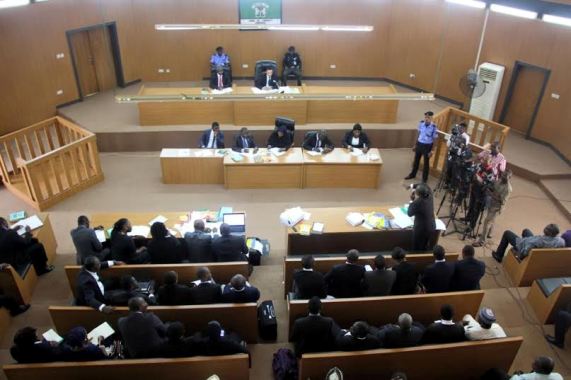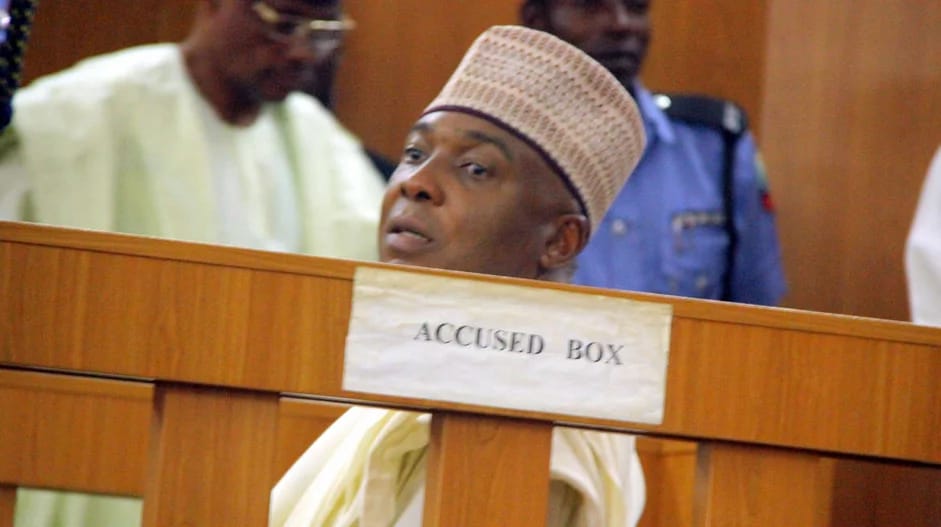By Ben Nwabueze
It is a measure of the importance attached to the Code of Conduct that the oath of office prescribed for the President (and State Governor) in the Seventh Schedule to the Constitution requires them to swear not only to “preserve, protect and defend the Constitution,” but specifically to “abide by the Code of Conduct.”
The relevant provisions of the Code for present purposes are contained in paragraphs 1, 6, 9, 11 and 13 of the Fifth Schedule which, for ease of reference, are herein reproduced.
1. A public officer shall not put himself in a position where his personal interest conflicts with his duties and responsibilities.
6. (1) A public officer shall not ask for or accept property or benefits of
any kind for himself or any other person on account of anything done or omitted to be done by him in the discharge of his duties.
(2) For the purposes of sub-paragraph (1) of this paragraph, the receipt by a public officer of any gifts or benefits from commercial firms, business enterprises or persons who have contracts with the government shall be presumed to have been received in contravention of the said sub-paragraph unless the contrary is proved.
(3) A public officer shall only accept personal gifts or benefits from relatives or personal friends to such extent and on such occasions as are recognised by custom.
9. A public officer shall not do or direct to be done, in abuse of his office, any arbitrary act prejudicial to the rights of any other person knowing that such act is unlawful or contrary to any government policy.
11. (1) Subject to the provisions of this Constitution, every public officer
shall within three months after the coming into force of this Code of Conduct or immediately after taking office and thereafter –
(a) at the end of every four years; and
(b) at the end of his term of office, submit to the Code of Conduct Bureau a written declaration of all his properties, assets, and liabilities and those of his unmarred children under the age of eighteen years.
(2) Any statement in such declaration that is found to be false by any authority or person authorised in that behalf to verify it shall be deemed to be a breach of this Code.
(3) Any property or assets acquired by a public officer after any declaration required under this Constitution and which is not fairly attributable to income, gift, or loan approved by this Code shall be deemed to have been acquired in breach of this Code unless the contrary is proved.
13. A public officer who does any act prohibited by this Code through a nominee, trustee, or other agent shall be deemed ipso facto to have committed a breach of this Code.
The most far-reaching of the stipulations in the Code is that contained in paragraph 1 above, which enjoins a public officer not to “put himself in a position where his personal interest conflicts with his duties and responsibilities.” The provision in the paragraph underscores the nature of a public office as a public trust, with all the obligations and restrictions which the law imposes on trustees of a private trust.
State or political power is held and exercised by the rulers in trust for the public, from which it follows that those entrusted with it are subject to the obligations and restrictions implied in the concept of trusteeship, in particular the duty of honesty and fidelity, and the prohibition against using the position for personal benefit. Both the duty and the prohibition are sanctioned by making the trustee strictly accountable for any such benefit or profit, and generally for the way he administers the trust. Accountability is thus a cardinal principle of the trust concept, to which trustees, whether of a private or public trust, must conform.
Perhaps, next in importance to the provision in paragraph 1 is that in paragraph 9 enjoining a public officer “not to do or direct to be done, in abuse of his office, any arbitrary act prejudicial to the rights of another person knowing that such act is unlawful or contrary to any government policy” (emphasis supplied). The provision addresses more squarely the problem of abuse of office. It is reinforced by the provision in section 15(5) of the Constitution directing the state to “abolish all corrupt practices and abuse of power.”
Paragraph 13 of Code is also worthy of note. A person fronting for a public officer in the perpetration of corrupt practices or abuse of office is a “nominee, trustee or other agent” within the meaning of the paragraph; accordingly, the President or any other public officer perpetrating corrupt practice or abuse of office through a front “shall be deemed ipso facto to have committed a breach of this Code,” under the said paragraph 13.
Sanctions prescribed by the Code for breaches of its stipulations
The Code prescribes sanctions for breaches of its stipulations. The sanctions are listed in general terms in paragraph 18(2) of the Fifth Schedule to include “(a) vacation of office or seat in any legislative house, as the case may be; (b) disqualification from membership of a legislative house and from the holding of any public office for a period not exceeding ten years; (c) seizure and forfeiture to the State of any property acquired in abuse or corruption of office,” and (d) “such other punishment as may be prescribed by the National Assembly” (paragraph 18, Fifth Schedule).
As stated above, the sanctions specified in paragraph 18(2) of the Fifth Schedule are in somewhat summary terms; they are not exhaustive of the provisions of the Constitution relevant on the matter. A relevant provision is that in section 185(1) which says that “a person elected to the office of Governor…..shall not begin to perform the functions of that office until he has declared his assets and liabilities as prescribed in this Constitution and has subsequently taken and subscribed the Oath of Allegiance and oath of office prescribed in the Seventh Schedule to this Constitution” (emphasis supplied) : see sections 140, 149 and 152 as respects the President and other executive functionaries at the federal level.
The provision of section 185(1) only means that a person shall not enter upon the actual exercise of his right to perform the functions of his office until he has declared his assets and liabilities; it does not take away or otherwise affect the right to perform, or the entitlement to the performance of, the functions of the office, which comes into existence independently of the declaration of assets and liabilities. The taking of the Oath of Allegiance and oath of office is a condition for the commencement of the office because it is so prescribed in section 180(2), and not because of its being mentioned in section 185(1). A person duly elected to the office becomes a Governor and has a right not only to perform or exercise its powers or functions, but also to all the privileges, perquisites, paraphernalia and dignities of the office directly he takes the Oath of Allegiance and oath of office. That follows from section 180(2), not from section 185(1).
Failure to declare assets and liabilities only postpones, not the commencement of the office and its powers, privileges, perquisites, paraphernalia and dignities, but only the entering upon the actual exercise or performance of the functions – only the performance of the functions of the functions of the office is postponed.. It does not postpone the enjoyment of the privileges, perquisites, paraphernalia and dignities of the office. Putting it differently, a person duly elected and sworn-in to the office is not any the less a President, Vice President, Governor or Deputy Governor because he has not declared his assets and liabilities. That would be a palpable distortion of the Constitution. Only the taking of the Oath of Allegiance and oath of office, but not the declaration of assets and liabilities, is prescribed in section 180(2) as a condition for the commencement of the office.
It would be preposterous to suggest that a person duly elected and sworn-in as Governor cannot use the title “Governor” or the style “Excellency”, use the car attached the office or move into the Governor’s official residence because he has not declared his assets in accordance with section 185(1). Surely, he is not performing the functions of the office in the sense of section 185(1) by using or being addressed by the title “Governor” or the style “Excellency” or by riding in the Governor’s official car or by moving into the Governor’s official residence. These are mere privileges, perquisites, paraphernalia and dignities attached to the office, and are independent of, and separate from, its powers or functions.
Had it been the intention that the declaration of assets and liabilities should also be a condition for the commencement of the office, and should have the same status and importance as the taking of the oaths, then, it should have been so prescribed in section 180(2) of the Constitution. Observance of the Code of Conduct by public servants is specifically enjoined by section 172 of the Constitution, and is therefore undoubtedly important, yet failure to do so, including failure to declare assets and liabilities, is not meant to carry the consequence of preventing the commencement of an office to which a person has been duly elected and sworn-in, as distinct from postponing the entering upon the actual exercise or performance of its functions.
The consequence of failure to observe and conform to the Code of Conduct, including failure to declare assets, is prescribed elsewhere in the Constitution, i.e. section 182(1)(e) which provides:
“No person shall be qualified for election to the office of Governor of a State if….within a period of less than ten years before the date of election to the office of Governor of a State he has been….found guilty of the contravention of the Code of Conduct.”
(See sections 66(1), 107(1)(d) and 137(1)(e) in respect of members of the legislative houses, and the President respectively)..
Thus, the consequence is not automatic or self-executing. There has to be a finding of guilt for contravention of the Code, including failure to declare assets or false declaration of assets. And, the power to make such a finding of guilt is vested in a Code of Conduct Tribunal upon the matter being referred to it by the Code of Conduct Bureau. The CCT has thus a crucial role in the machinery established by the Constitution for the enforcement of the Code which makes the character, status, independence, impartiality and integrity of the Tribunal a matter of the greatest importance. The Tribunal is also empowered, after the due process of trial and determination of guilt, to order, besides the disqualification prescribed in the section referred to above, vacation of office and seizure or forfeiture to the state of any property acquired in abuse or corruption of office : paragraph 18 of the Fifth Schedule to the Constitution. These provisions clearly make it untenable that the Constitution ever intended that failure to declare assets and liabilities should have the automatic or self-executing consequence of preventing the commencement of an office to which a person has been duly elected.
Furthermore, the word “subsequently” used in section 185(1) is not conclusive as to whether declaration of assets must be made before the taking of the oaths. The word “subsequently” is omitted in section 140 relating to the President. Paragraph 18(1) of the Code of Conduct in the Fifth Schedule, which is the provision bearing more directly and squarely on the declaration of assets, only requires a public officer to submit his declaration of assets and liabilities to the Code of Conduct Bureau “within three months after the coming into force of this Code of Conduct or immediately after taking office” (emphasis supplied), not before taking office by taking the oaths. In other words, the taking office or its commencement comes before the submission of the declaration of assets.
In any case, the fact that the taking of the prescribed oaths occurred before, and not, as provided in section 185(1), “subsequently” to, the declaration of assets and liabilities is not a matter of substance, but one of sequence only, which at worst is just a procedural irregularity which should not, therefore, render the swearing-in legally invalid. With respect to the provision in section 185(2) that “the Oath of Allegiance and the oath of office shall be administered by the Chief Judge of the State”, the incapacity of the Chief Judge to administer the oaths by reason of having passed the compulsory retirement age of 65 years at the time was held by the Supreme Court to be a mere irregularity which does not, and cannot, invalidate the swearing-in. In the words of Akintan JSC, the alleged incapacity of the Chief Judge is “a mere irregularity which could not have the effect of nullifying or vitiating the appointment of the Governor”: Att-Gen of Anambra State v. Att-Gen of the Federation & Others [2005] 9 NWLR (Parts 929 – 931) 572 at page 653.
The machinery established by the Constitution for the enforcement of the stipulations of the Code of Conduct
The enforcement machinery established by the Constitution consists of a Code of Conduct Bureau (CCB) and a Code of Conduct Tribunal (CCT). The former is entrusted with the responsibility to (a) receive declarations of assets by public officers; (b) to examine such declarations in accordance with the requirements of the Code of Conduct or any law; (c) to keep custody of them and make them available for inspection by any citizen of Nigeria on such terms and conditions as the National Assembly may prescribe; (d) ensure compliance with and, where appropriate, enforce the provisions of the Code of Conduct or any law relating thereto; (e) receive complaints about non-compliance with or breach of the provisions of the Code or any law in relation thereto, investigate the complaint and, where appropriate, refer such matter to the Code of Conduct Tribunal (CCT) (para 3, Third Schedule). The CCT is to try such complaints as are referred to it by the Bureau and, where it finds a person guilty of non-compliance with, or contravention of, the Code, impose any of the prescribed sanctions.
An assets verification and valuation exercise seems clearly implied in the above-quoted provisions of the Third and Fifth Schedules. For, the responsibility of the CCB to “examine” assets declarations submitted to it cannot be meaningfully discharged unless the assets are verified and valued. The responsibility cast on the CCB to “examine” assets declarations bestows on it by implication authority to verify an assets declaration or to have it verified in terms of paragraph 11(2) of the Code of Conduct. It makes little sense to require public officers to submit declarations of assets and liabilities at specified times if these are not subject to verification and valuation by the CCB and if the public has no access to them. The verification and valuation exercise may well be the greatest boost in the fight against corruption and the most innovative event in the history of the anti-corruption war. The lack of it has deprived assets declaration of much potency, and has made it look like a farce.
The application of the Code of Conduct to public servants generally besides public officers as defined and as listed in the Fifth Schedule
The provisions of the Constitution relating to the Code of Conduct seem somewhat confused and confusing; they manifest a certain ambiguity and inconsistency. Whilst the Code, as scheduled to the Constitution (Fifth Schedule) by section 318, is headed Code of Conduct for Public Officers, and whilst the duties it imposes and the sanctions it prescribes for breaches of those duties are laid specifically and exclusively on public officers as defined and as listed in the Fifth Schedule, section 172 of the Constitution provides that “a person in the public service of the Federation shall observe and conform to the Code of Conduct” – section 209 at the State level. “Public service of the Federation” is defined in section 318(1) as meaning “the service of the Federation in any capacity in respect of the Government of the Federation,” whether as messenger, clerk, or whatever.
There is an ambiguity and inconsistency in requiring a public servant, who is not a public officer as defined and as listed in the Fifth Schedule, e.g. a messenger or clerk, “to observe and conform to the Code of Conduct”, all of whose commands, sanctions and provisions relate and apply exclusively to public officers. But it seems that what is intended and required of a public servant, who is not a public officer, is “to observe and confirm to” the essence and spirit of the Code. The essence and spirit of the Code seems well encapsulated by the provision in the Code of Conduct Bureau and Tribunal Act cap 56, Laws of the Federation 1990 edn to the effect that:
“The aims and objectives of the [Code] shall be to establish and maintain a high standard of morality in the conduct of government business and to ensure that the actions and behaviour of public [servants] conform to the highest standards of public morality and accountability.”
The provision expresses an ethic and civic virtue which all categories of public servants should imbibe as well as observe and conform to.
The provision of section 172 enjoining public servants, who are not public officers, “to observe and conform to the Code of Conduct” is no less obligatory on them notwithstanding that no sanctions are prescribed for failure by them to do so. Sanctions are meant to reinforce the duty, and their absence should not diminish or detract from the obligatoriness or binding force of the duty. A citizen of good repute and integrity obeys the law because it is his or her duty to do so, not so much to avoid the wrath of the law being visited on him or her.
Advertisement
Excerpts of a paper presented at the inauguration of Ben Nwabueze Centre for Studies in Constitutional Law and Related Subjects
Views expressed by contributors are strictly personal and not of TheCable.
1 comments







Its really helpful and I look forward to getting more update on the code of conduct bureau and tribunal sittings